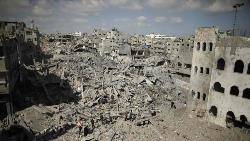12-hour truce comes into force in Gaza
26/07/2014| IslamWeb
A 12-hour ceasefire came into force between Israel and Hamas in the Gaza Strip at 8am (05:00 GMT) on Saturday, the 19th day of the Israeli aggression that has killed at least 900 people.
Israel and the Palestinian armed group said they would observe the temporary UN-mediated ceasefire, after US Secretary of State John Kerry was unable to reach a lasting truce during talks on Friday in Cairo.
In the occupied West Bank, which had been relatively calm for years, nine Palestinians died on Friday as protests raged for a second day against Israel's Gaza offensive and the rising casualty toll there.
A few minutes into the scheduled start of Saturday's ceasefire, it was still difficult to know if the fighting had stopped in all parts of the Gaza Strip, Al Jazeera's Nicole Johnston reported.
"Sometimes it does continue in pockets for a little while. It may take some time for the ceasefire to completely come into effect," she said.
In the lead-up to the ceasefire, she said the battles were "incredibly heavy" overnight.
"Rockets have been fired from Gaza. I heard constant sounds of shelling from the Israeli navy ships that are positioned just off the coast," she said.
At least 10 houses in Gaza were reportedly struck by Israeli aircraft overnight, she said, including one house in Khan Younis, where at least 20 people, most of them members of the same family, died.
"Ahead of the ceasefire, it was a very difficult night for the people of Gaza," Al Jazeera's Johnston said.
Emergency services spokesman Ashraf al-Qudra said the bodies of at least 35 Palestinians were recovered from rubble across Gaza during the three first hours of the ceasefire, raising the total death toll to more than 900.
Diplomatic push
The announcement of the truce came just hours after Israel's cabinet rejected the terms of a US-sponsored longer-lasting ceasefire that was meant to end the fighting.
Speaking in Egypt, Kerry confirmed the rejection but said diplomats were still trying to work out a deal.
Kerry met UN Secretary-General Ban Ki-moon in Cairo on Friday, and spoke by telephone to his Qatari and Turkish counterparts.
He will fly to Paris on Saturday for another conference on Gaza.
Israel has already indicated it plans to step up its incursion into the Palestinian territory.
Since Israel's assault on Gaza began on July 8, rockets fired from Gaza into Israel have killed two Israeli civilians and a Thai migrant worker. A total of 35 Israeli soldiers have died in Gaza.
The growing casualties in Gaza have caused anger in the West Bank, prompting two days of mass protests in several cities and deadly clashes with Israeli police.
Al Jazeera's Imtiaz Tyab, reporting from the West Bank, said thousands took to the streets in Hebron, Bethlehem, Jenin and other cities on Friday night and into early Saturday. Israeli forces used live rounds and tear gas to disperse protesters.
On Thursday night, 10,000 demonstrators marched in solidarity with Gaza near the Palestinian administrative capital Ramallah - a scale recalling mass revolts of the past.
Protesters surged against an Israeli army checkpoint, throwing rocks and Molotov cocktails, and Palestinian medics said one was shot dead and 200 wounded when troops opened fire.
The Palestine Liberation Organization called for more demonstrations in the West Bank and said it was at the same time working to secure a ceasefire deal.
PHOTO CAPTION
A general view of destruction in the Shejaia neighborhood, which witnesses said was heavily hit by Israeli shelling and air strikes during an Israeli offensive, is seen in Gaza City July 26, 2014.
Al-Jazeera

